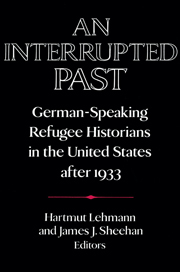Book contents
- Frontmatter
- Introduction
- PART I: Introduction
- 1 German and American Historiography in the Nineteenth and Twentieth Centuries
- 2 German Historiography during the Weimar Republic and the Émigré Historians
- 3 The Historical Seminar of the University of Berlin in the Twenties
- PART II: Introduction
- 4 Refugee Historians in America: Preemigration Germany to 1939
- 5 “Uphill Work”: The German Refugee Historians and American Institutions of Higher Learning
- 6 Everyday Life and Emigration: The Role of Women
- 7 The Special Case of Austrian Refugee Historians
- 8 Schicksalsgeschichte: Refugee Historians in the United States
- 9 German Historians in the Office of Strategic Services
- 10 The Refugee Scholar as Intellectual Educator: A Student's Recollections
- PART III: Introduction
- 11 German Émigré Historians in America: The Fifties, Sixties, and Seventies
- 12 The Americanization of Hajo Holborn
- 13 Explaining History: Hans Rosenberg
- 14 Ernst Kantorowicz and Theodor E. Mommsen
- 15 Refugee Historians and the German Historical Profession between 1950 and 1970
- Conclusion
- Index
10 - The Refugee Scholar as Intellectual Educator: A Student's Recollections
Published online by Cambridge University Press: 05 January 2013
- Frontmatter
- Introduction
- PART I: Introduction
- 1 German and American Historiography in the Nineteenth and Twentieth Centuries
- 2 German Historiography during the Weimar Republic and the Émigré Historians
- 3 The Historical Seminar of the University of Berlin in the Twenties
- PART II: Introduction
- 4 Refugee Historians in America: Preemigration Germany to 1939
- 5 “Uphill Work”: The German Refugee Historians and American Institutions of Higher Learning
- 6 Everyday Life and Emigration: The Role of Women
- 7 The Special Case of Austrian Refugee Historians
- 8 Schicksalsgeschichte: Refugee Historians in the United States
- 9 German Historians in the Office of Strategic Services
- 10 The Refugee Scholar as Intellectual Educator: A Student's Recollections
- PART III: Introduction
- 11 German Émigré Historians in America: The Fifties, Sixties, and Seventies
- 12 The Americanization of Hajo Holborn
- 13 Explaining History: Hans Rosenberg
- 14 Ernst Kantorowicz and Theodor E. Mommsen
- 15 Refugee Historians and the German Historical Profession between 1950 and 1970
- Conclusion
- Index
Summary
More subjective than many of the other essays in this exploration, the shards of memory that follow offer at best a worm's-eye view of the presence and impact of the émigré historian. Mine is the perspective of a student of yesteryear looking up, not of the historical scholar of today looking back. If this attempt at Rezeptionsgeschichte based on personal recollection alone has any justification here, it is twofold: First, that it may point to the swiftly changing context of American political and academic culture of the 1930s and 1940s in which the professional influence of the émigrés was exercised. Second, that it may remind us of the power of the émigrés in the formation of the American student's mental outlook in areas lying well beyond purely professional historical education.
We sometimes forget how much time passed before émigré scholars secured a foothold in American colleges and universities. Even among those who left Germany immediately after Hitler's seizure of power, many spent some years in France or England before finally reaching our shores. Such was the case with all those who became my respected older friends and informal mentors: Fritz Epstein, Felix Gilbert, Hajo Holborn, Herbert Marcuse, and Franz Neumann. Of course, once they reached these shores their often painful search for a position in a depressed academic market further retarded the construction of new careers, the securing of the very institutional foundations of their influence.
- Type
- Chapter
- Information
- An Interrupted PastGerman-Speaking Refugee Historians in the United States after 1933, pp. 140 - 146Publisher: Cambridge University PressPrint publication year: 1991



